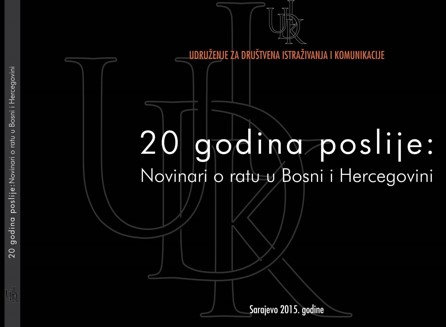
TADIĆ JE MORAO ZNATI DA JE RS SAMO ENTITET U OKVIRIMA MEĐUNARODNO PRIZNATE BIH
Interview with Teofil Pančić
More...We kindly inform you that, as long as the subject affiliation of our 300.000+ articles is in progress, you might get unsufficient or no results on your third level or second level search. In this case, please broaden your search criteria.

Interview with Teofil Pančić
More...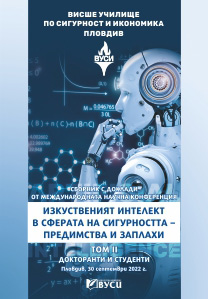
The study reveals the essence of the participation of the structures of the Ministry of Interior in emergency situations.
More...
In the selected topic our attention is focused on outlining the existing problem areas and factors influencing the determination of a positive image of the Ministry of Internal Affairs in a situation of communication during a crisis of confidence. The emphasis on PR is placed in order to overcome the existing problems with the internal and external audiences of the Ministry of Internal Affairs, as a number of sociological studies report that the Ministry of Internal Affairs is among the institutions with the lowest values of public trust, whose structure is the National Police.
More...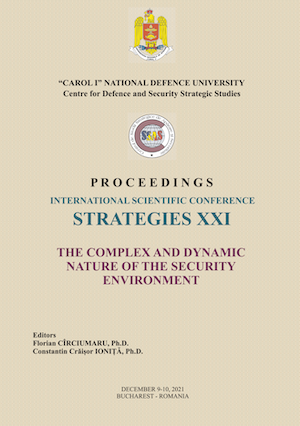
This paper synthetizes earlier studies and aims to investigate how the nuclear equilibrium between the United States and the Russian Federation may change, because of the process of proliferation. A theoretical perspective combining power transition and rational deterrence theory is used to draw a few scenarios. The main goal is to develop general traits and tendencies, by varying the variable of power distribution and use them to develop a few scenarios.
More...
Even though the Cold War ended 30 years ago, the Russian Federation and the United States of America continue the competition for power through different means and by using several instruments. The Syrian war is one of the longest and complex events in which the two states have recently exposed their capabilities. On the one hand, the Russian Federation found the Syrian war as an opportunity to improve its economy, extend its military influence and gain more allies by supporting Syrian regime and situating as a counterweight to USA. On the other hand, the United States of America fought to maintain its economic gains, strategic coalitions and limit Iran power in the region, using as motif the establishment of democracy and counterterrorism. All of these represented the most important assets of each state towards increasing their authority outside their borders and consolidating their power status in the last6 years.
More...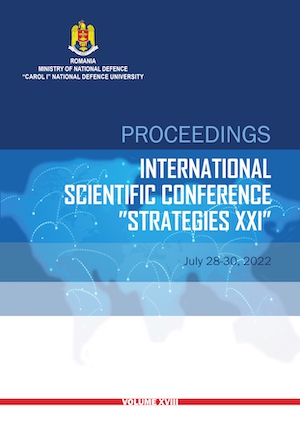
India is one of the two demographic superpowers of the world and one of the most important regional actors with a great deal of potential for playing an important part on the world stage. From a military point of view, India is the fourth most powerful country in the world, according to Global Power, economically speaking, being the fifth most powerful country on a global scale, with growing trends, while geographically speaking, it is the seventh largest country in terms of area, however, it occupies a very advantageous geopolitical position. India is seen as a strong voice within BRICS and the UN against proposals or actions that could harm the interests of any member. It rejected China's proposal to invite Pakistan, Sri Lanka and Mexico into BRICS because India believed that the focus should be on developing the current members rather than inviting other weaker nations and that bringing these nations would drag BRICS down as an alliance and ultimately meet the same fate as the European Union. At the same time, different issues of the regional security ecuation of Asia (South-East Asia – India) – Pacific and complications which have resulted from Russia’s invasion of Ukraine in the ierarchy of the most influencial international actors make India’s standing and role more important indecision-making on both a regional and a global level.
More...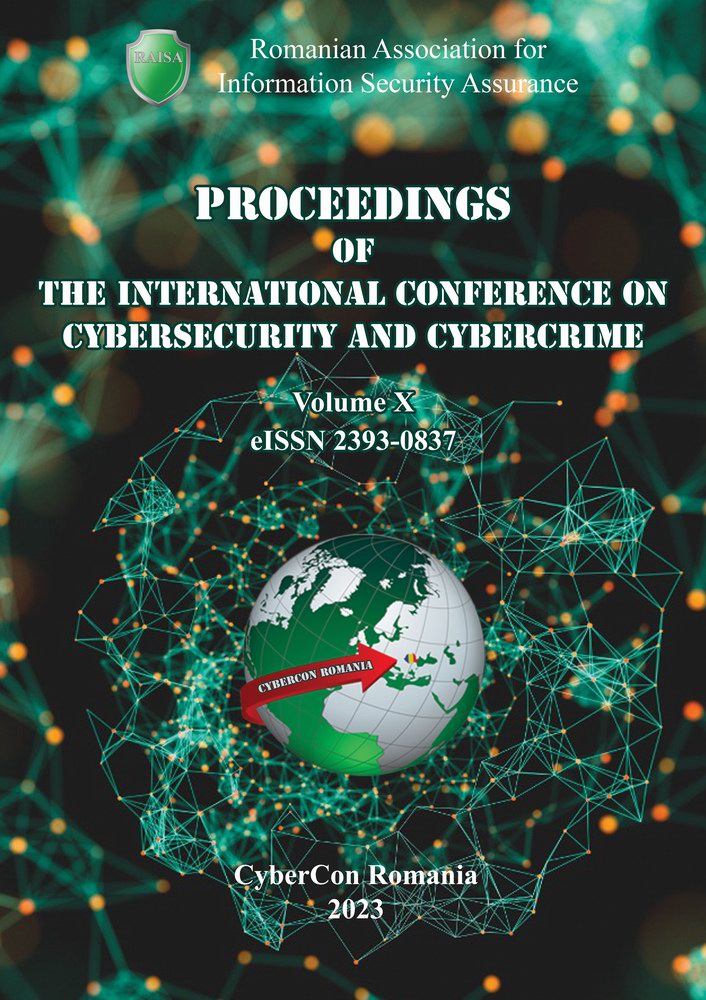
This paper discusses the role of disruptive and innovative technologies for countering the spread of terrorist online content (TCO). In particular, it focuses on the use of Artificial Intelligence (AI) in support to Host Service Providers (HSPs) and Law and Enforcement Agencies (LEAs). The violent and terrorist content is more and more disseminated online taking advantages of the opportunities offered by Internet. The diffusion of terrorist propaganda has a negative impact on the civil society and poses several risks. For this reason, the European institutions published in 2021 the Regulation (EU) 2021/784 to address the misuse of hosting services for the dissemination to the public of TOC. It regulates the measures to be applied by HSPs and Member States’ authorities in order to identify and ensure the quick TOC removal and to facilitate cooperation with each other and Europol. In order to be compliant with these dispositions, AI-based disruptive technologies can provide LEAs and HSPs, especially the small and micro-ones, a concreate support. The implementation of the Regulation and the use of AI technologies have legal and ethical implications that have to be considered. The paper is based on the work and preliminary research conducted in the framework of the European funded project ALLIES, “AI based framework for supporting micro and small Hosting Service Providers (HSPs) on the report and removal of online terrorist content”, Grant Number 101080090.
More...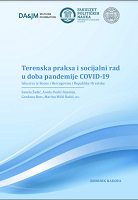
U Federaciji Bosne i Hercegovine od 2015. godine u primjeni je Zakon o zaštiti i postupanju sa djecom i maloljetnicima u krivičnom postupku FBiH19. Zakon predstavlja strateški zaokret i donosi određene novine u oblasti maloljetničkog prijestupništva. Temelji se na rješenjima savremenog krivičnog zakonodavstva, međunarodnim standardima i iskustvima dobre prakse drugih zemalja. Zakonom se utvrđuju posebna pravila postupanja prema djeci koja su u sukobu sa zakonom, mlađim punoljetnim osobama i djeci koja su žrtve ili svjedoci, pri tome poštujući najbolji interes djeteta te omogućavajući da dijete, u skladu sa uzrastom, iskaže svoje interese. Njegova primjena u praksi zahtijeva pravovremenu reakciju i osposobljavanje svih nadležnih organa, prvenstveno stručnih osoba organa starateljstva, odnosno centra za socijalni rad.
More...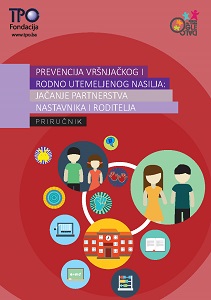
Jedno od najvažnijih pitanja suvremene nastave je pripremiti, omogućiti i realizirati suradnju škole i obitelji. Škola kao odgojno-obrazovna ustanova i specifičan oblik organizacije, posljednjih godina radi na osnaživanju i modernizaciji rukovodstva s ciljem usklađivanja ljudskih, fizičkih i financijskih potencijala. Modernizacijom obrazovnog sustava rukovodstvo daje sve veći značaj izgradnji kooperativnih odnosa vezanih za školu, suradnji škole sa roditeljima i širom društvenom zajednicom. Kako je ukupan obrazovni sustav praktično pred vratima reformskih procesa, tako je pred rukovodstvom veliki zadatak iznaći adekvatna rješenja za stvaranje demokratične škole po mjeri djeteta, izgradnju harmoničnih, suradničkih odnosa za rad i kontinuirano razvijanje partnerskih odnosa sa roditeljima i širom društvenom zajednicom.
More...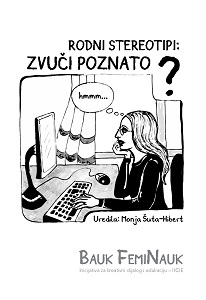
Knjiga „Rodni stereotipi: Zvuči poznato?“ predstavlja veoma korisnu i interesantnu publikaciju koja nas suočava s predrasudama kreiranim oko pojmova roda i feminizma. U dvanaest tekstova prikazano je kako rodni stereotipi egzistiraju unutar društvenih i ideoloških matrica, ali i kako oni, u svakodnevnim i konkretnim situacijama, postaju sastavnim dijelom naših vlastitih zabluda. Realnost i konkretna patnja, koje se mogu prepoznati u brojnim navedenim životnim situacijama i pričama, djeluju kao žestok podsjetnik na teške i bolne sudbine žena na ovim prostorima, ali i kao koherentan i stručan materijal za edukaciju u oblasti rodnih studija i proučavanja rodnih stereotipa. U tom kontekstu, vrijednost ove knjige jest što na jednostavan način, prikazujući realne situacije, uključuje čitaoce u prepoznavanje takvih situacija te ih ujedno senzibilizira na pružanje otpora prihvaćenim i etabliranim rodnim stereotipima.
More...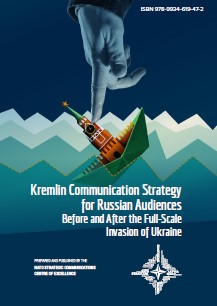
After February 2022 the social media platform Telegram became ‘one of the most important informational vectors regarding the war’. The unprecedented spike in communications on the platform, which has been re-corded by ExTrac and discussed in the previous part, has given researchers a unique opportunity to examine Russia’s online media environment. While the ExTrac analysis focused on the quantitative increase of Telegram’s significance among Russian social media users, this part qualitatively analyses the content shared on the platform. It aims to shed light on the emergence of a new group of Russian online influencers—the so-called pro-war bloggers. Propelled into the limelight by a surge in online media, the Kremlin’s blocking of Western social media platforms, and increased demand from users for news about the war, these Telegram channels’ administrators formed an online eco-system which became instrumental in spreading pro-Russian narratives at home and abroad.
More...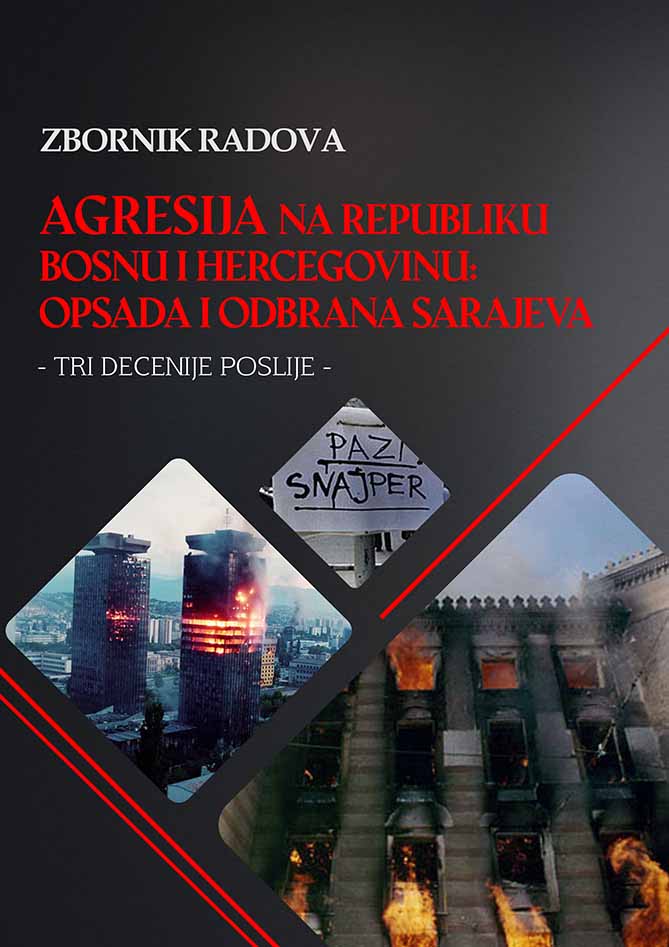
International community has, on its own will, taken the responsibility to resolve the situation in the then Socialist Federative Republic of Yugoslavia, following its dissolution. This has particularly applied to the Republic of Bosnia and Herzegovina, which was threatened by an open aggression, even disappearance. To that end, ample peace plans were designed, and to a large extent based on ethnic divisions, which suggested intentions of the international community in relation to Bosnia and Herzegovina. Lack of a good will and unity aimed at prevention of aggression against Bosnia and Herzegovina, including the prevention of mass crimes against its citizens, including the crime of genocide, as well as failure to prevent the destruction of state owned infrastructure, silent approval of the several years long siege of the capital, clearly speaks about the attitude on the part of international actors towards the aggressors and innocent victims, particularly the state of Bosnia and Herzegovina. Lack of condemnation of the aggression, and permanent attempts to equalize the victims and aggressors serve as a direct confirmation that the initial attitude towards Bosnia and Herzegovina did not significantly change, although the circumstances to a large extent did. Current development of the situation on a global plan affects the changes in the perception of threat, including the relevance of the Western Balkans, and more specifically Bosnia and Herzegovina, which now suggests the new discourse of the West (EU and NATO Member States) in relation to Bosnia and Herzegovina. The paper is structured in five chapters: Dissolution of SFRY and international recognition of the Republic of Bosnia and Herzegovina; Quest for a peace solution in Bosnia and Herzegovina; Intensification of the international community engagement; Final NATO operation and peace establishment; Post-war reaction of the international community in Bosnia and Herzegovina, and Final considerations. The study is based on the qualitative analysis of documents and critical analysis of activities and actions of the international community in Bosnia and Herzegovina in the period 1991-2022.
More...
The political goal of the total demographic extermination of the Bosniac Muslim people in Bosnia and Herzegovina is evidenced by the criminal practice on the part of the aggressor, which tried to systematically persecute said people from the territory in which they always lived. Such a goal could not be achieved in another way, but by criminal methods of waging warfare. In order to cover up the aggressive nature of the military force use against the Republic of Bosnia and Herzegovina, presenting it as a civil war within an internationally recognized country, the Belgrade regime established a so-called Republika Srpska para-state and constituted an army of the said para-state, which made an integral part of the Army of the Federal Republic of Yugoslavia (FRY). The unjust and criminal political and military goals determined and directed the war of aggression primarily against the non-Serb civilian population, and only than against the other armed forces, given that most of the killed victims were civilians. The unjust policy based on the great-Serbian ideology against Bosnia and Herzegovina continued even after the signing of the General Frame-work Agreement for Peace in Bosnia and Herzegovina (hereinafter the Dayton Agreement), and continued up to the present day. This is just another proof that Serbia has not yet sincerely and in good faith recognized territorial integrity and the sovereignty of Bosnia and Herzegovina, indicating that all anomalies and blockades in the implementation of the Dayton Agreement are a signal that Serbia, as of this day, does not consider its internationally recognized borders as being final. Such policy of the Belgrade regime is most concretely and indeed most destructively manifested in their attempts to cover up war crimes and glorify war criminals, aspiring to shifting the blame for starting the war and its consequences onto victims, and in that regard to equalize responsibility of the aggressor and Bosnia and Herzegovina defenders, ultimately to change the character of war. It is precisely the reason why the judiciary in the states that acted as aggressors against Bosnia and Herzegovina in the period 1991-1995 was burdened with anomalies resulting in blockades, even the setbacks in the commitments from the Dayton Agreement. This is the reason why trust cannot be built and reconciliation cannot be achieved on such foundations between the peoples and states of the Western Balkans. In that context, various concrete cases of unjust and illegal protection of war criminals should be analyzed, as well as numerous indictments fabricated by the Serbian regime and the Bosnia and Herzegovina entity of Republika Srpska should be considered. Obvious example of such practice is the indictment, including its confirmation, related to the events in Sarajevo’s Dobrovoljačka Street on May 3, 1992.
More...
The defence of Bosnia and Herzegovina, including the defence of Sarajevo, was based on political and patriotic awareness of its citizens, who were genuinely committed to preservation of Bosnia and Herzegovina specific political and statehood being, as a community of equal citizens and peoples. Based on assessment of a big relevance of Sarajevo for the survival of Bosnia and Herzegovina, the aggressor has thoroughly planned, prepared, and utilised large military forces to conquer the city and establish there its occupational authority. They wanted Sarajevo to be only a Serb capital of the so-called “Republic of Serb Bosnia and Herzegovina”. The combat activities carried out by the 1st Corps of the Army of the Republic of Bosnia and Herzegovina were organised in a very complex strategic, operational, and tactical conditions, under the conditions of besieged free territories in which the units and the commands of the Army of the Republic of Bosnia and Herzegovina operated, including the conditions of specific military siege of a major part of the 1st Corps in the city of Sarajevo. Strategic and operational-tactical positions of the aggressor’s forces were rather favourable for them, given that they controlled main roads that were connecting Bosnia and Herzegovina battlefield with the sources of mobilization into the aggressor’s army with soldiers and material means in the so called Federal Republic of Yugoslavia (Serbia and Montenegro), and the countries that supported aggressor. The extent of human losses, during and after every war, turned into a big political, historic, and moral and ethical issue. Pursuant to the character of response of the warring parties and their allies to the question of the extent of human losses, it is possible to identify the character of policy that served as a basis for war engagement and support to any of the warring parties. In general, the factors on the side of the warring party that waged the righteous war strive to present truthfully the number of victims, whereas the factors on the side of the warring party that waged unfair war strive to fake the number of victims and adapt it to the character of its unfair political views related to the causes and consequences of the war. Given the fact that the international community with its embargo harmed the Republic of Bosnia and Herzegovina defence forces, which operated on the grounds of fair policy and righteous war, we arrive at a conclusion that the embargo was unfair, in favour of unfair aggressor’s policy, criminal and genocidal war practice.
More...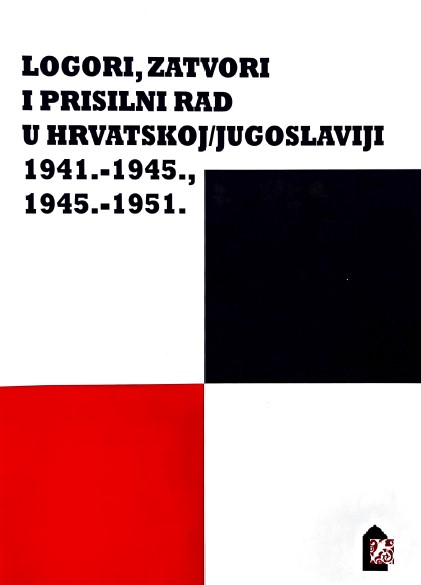
The study focuses on the concentration camp Loborgrad for women and children in Northwest-Croatia from the time of its erection in October 1941, till the deportation of nearly all of its internees to Auschwitz in August 1942. Its about 1500 mostly Jewish prisoners came from Bosnia (Sarajevo) and Nor-thern Croatia, apart from them were some Jewish refugees, among these many from Vienna, plus approximately 200 Serbian women. Before the deportations the latter were sent to Serbia or to Germany in order to perform forced labor. Apparently the camp was under the supervision of the ”Jews Department” of the Ustaša police, however the commander in chief Karlo Heger and the gu-ards belonged to the ethnic German group. Physical abuses are reported from the camp, during epidemics in 1941/42 up to 200 inmates died.
More...
Restrictions to freedom and forced labour in the Croatian, that is Yugoslavian, legal system following the Second World War, during the period of “National Democracy,” was determined by a series of decrees, resolutions, and laws. From 1945 to 1951, the Yugoslavian penal code recognized four types of non-free labour: forced labour without the removal of personal freedom, forced labour with restrictions to personal freedom, corrective work and socially useful work. This article, on the basis of sources, literature, and above all the most important decrees, resolutions, and laws applied in Croatia, and elsewhere in Yugoslavia, during the period of “National Democracy”, from 1945-1951, reviews the matter of state repression and the question of the restrictions to freedoms and forced labour in the penal code.
More...
Forced labour in Serbia, in the first postwar years, appeared in specific situations and affected various social groups, and it was carried out in the conditions of revolutionary political change. During the time of liberation and immediately afterward “mobilization” appeared as a specific form of required labour, while in the later period work referred to as “required service” or “required work” received special significance. Failure to comply with these orders carried sanctions in terms or criminal or administrative penalties. Specific social categories, the war prisoners and Volksdeutsche (ethnic Germans), who li-ved in camps were employed as forced labour and their freedom was restricted as a whole; other social categories were required to work through judgments of the courts and these sentences could be applied in jails or in freedom; a third type of required labour, which affected groups such as pensioners, occurred due to a lack experts, requiring them to accept various jobs in order to maintain their pensions. Regardless of the type of category, forced labour was in fact mobilized free labour, which was employed in numerous construction sites, mines, or other objects in fulfillment of the first Five Year Plan.
More...
Forced labour for the Germans of Vojvodina was introduced in the first days after the new government was established. It was an expression of the necessity of making up shortages in the supply of labour as it was also seen as a punishment for the German minority’s support for the Axis powers during the Second World War and the participation of some of its members in war crimes. Some people were marched under armed guard to work in forests, fields, vineyards, the clearing of rubble, the construction or repair of buildings, roads, railways, and bridges, while some people were concentrated in special camps from which they were taken to work every day. The organization of work camps overlaps with the period of martial law, while the whole process took shape in stages, in an attempt to concentrate labour supply, preserve Ger-man property, open areas for the settlement of colonists and others. Conditions in the camps were inadequate in terms of supporting and maintaining the ability of inmates to perform work, and there was a lack of any motivation to improve them. In the autumn of 1947 it became clear that the policy toward the German minority was changing, and in the spring of 1948 the Communist authorities began to dismantle the camps. Because of these types of conditions and the fact that in the first years following the dismantling of the camps their work in large measure retained the qualities of forced labour, a large majority of Volksdeutsche decided to emigrate from Yugoslavia when this became a legal possibility. Their work, instead of contributing to the development of their homeland, contributed to the West German “economic miracle.”
More...
The work follows the evolution of the position of political convicts in Serbia in post-war period. Shortly after the end of the war, the position of political convicts was extremely bad and the prisoners were often subject to brutal torture. Prison conditions underwent gradual evolution in the period between 1953 and 1985, so that since the beginning of 50s, and especially during 60s and 70s, they grew better and better. Still, their improvement was limited by material as well as political and ideological factors and remained behind the standards of the west democracies.
More...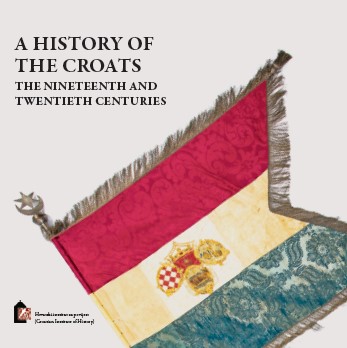
The duration and intensity of warfare in Yugoslavia and the Independent State of Croatia, the presence of significant occupation forces of the German Reich, Italy, and Hungary, and the activities of NDH Army, the Yugoslav Army in the Homeland (the Chetniks), and the People’s Liberation Army and the Partisan Detachments of Yugoslavia / Yugoslav Army resulted in direct conflicts between the warring parties, which led to severe human losses among the soldiers and civilians alike. The irreconcilable ideologies and political and military interests in the armed conflict and the civil war multiplied the casulaties.
More...